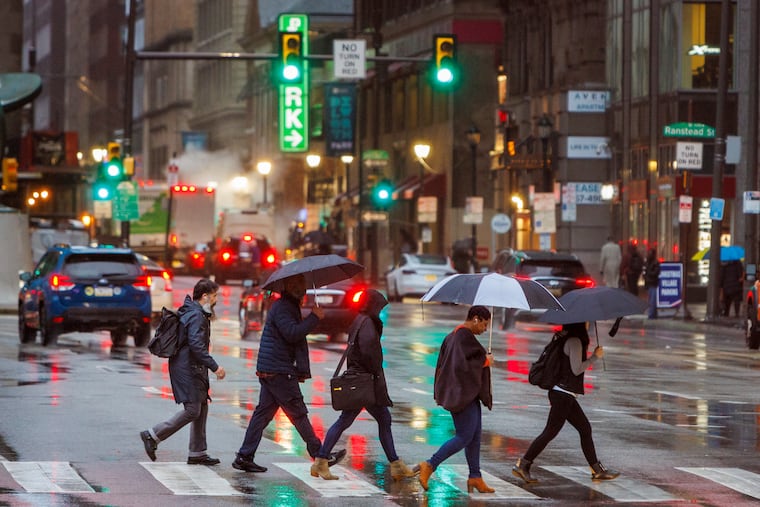Rain clears out of Philly, but flooding is possible into the evening
The overnight storm prompted some flooding, road closures, and evacuations across the region.

Sunday night’s storm brought fierce winds and flood warnings throughout the Philadelphia region before a clear sky ushered in more subdued rains Monday afternoon.
The overnight storm prompted some flooding, road closures, and evacuations across the region.
Philly and Jersey Shore folk watched the rain peter out Monday morning, while a cold front moved in, and temperatures gradually dropped from the high 50s to the 40s throughout day.
Philadelphia received a little more than 3 inches of rain over the course of the storm that ran from Sunday night into Monday afternoon, said Alex Staarmann, a meteorologist with the National Weather Service in Mount Holly. In the Pennsylvania suburbs, storm totals ranged from 2 to 4 inches. Meanwhile, the Shore saw 1 to 2 inches of rain.
» READ MORE: Sunday forecast: Another flood watch is up for the entire Philly region, and winds could gust to 60 mph at the Shore
But just because the rain stopped, doesn’t mean the region is safe from flooding. The National Weather Service’s flood warning for the Philadelphia region remained in effect into Monday evening.
That’s based on reports of flooding and water rescues in Montgomery and Delaware Counties, said Sarah Johnson, another meteorologist in the Mount Holly office, as well as elevated water levels in the Delaware River by Washington Avenue, the Schuylkill near 30th Street Station, Wissahickon Creek, and Pennypack Creek.
Staarmann said most of the Philly area’s streams and creeks should begin receding by Monday night. The Schuylkill is the only waterway that may continue to rise, said Staarmann, as water from the weekend’s storm — and a string of several prior wet Sundays — flows upstream and mixes with runoff.
In Philadelphia, flooding closed Columbus Boulevard between Spring Garden and Christian Streets. Traffic was redirected away from the area after cars struggled to drive through the rising water around 6 a.m.
Six homes on the 900 block of Springfield Road in Darby Borough were forced to evacuate around 8 a.m., as rising waters from Darby Creek rushed down the road.
Darby Borough Police Chief Joseph Gabe told 6ABC that the flooding began around 3:15 a.m. Monday, when officials closed the street. PennDot arrived on the scene soon after to unclog debris trapped under the bridge on MacDade Boulevard, said Gabe, but the water kept rising.
“It was up to the top step going into my apartment and they told us to get out. I had to real quick get dressed and get my dog so we could get out,” Darby resident Rich Moore told 6ABC.
Collingdale Police were called to Darby to help with road closures and evacuations but had to turn around as flooding continued. Between 10 and 12 homes on Florence Avenue were evacuated Monday morning, said Collingdale Police Chief Patrick Kilroy, who later said that the water had since receded. Evacuees from both boroughs were asked to shelter indefinitely at the Darby Recreation Center as their homes were assessed for damage.
Johnson, the weather service meteorologist, said it’s not possible to immediately determine if the rapidly intensifying storm reached bomb cyclone proportions, but she did stress that coastal storms are relatively common.
“We get multiple of these [storms] every cold season in the winter and spring,” Johnson said, while her colleague Staarmann mentioned a small chance of sprinkles or non-sticking snowflakes for early Tuesday morning.
These recent storms were generated by the powerful El Niño warming in the tropical Pacific, where sea-surface temperatures have been approximately 3.5 degrees Fahrenheit higher than normal. Those temperatures can create the upper-air winds that cause coastal storms, meteorologists say.
» READ MORE: If you think Sundays in Philly have been especially rainy lately, you’re right.
This storm marked the fourth consecutive weekend of showers in Philadelphia.
That’s because storm patterns often occur in seven-day sprints. So even if Philly has a slim-to-none chance of a white Christmas, Johnson said, it does have high odds of a wet one.